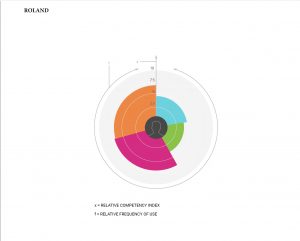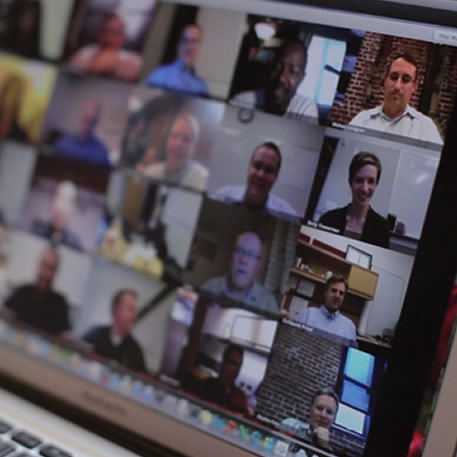Fully Online Learning Community (FOLC) Model
The Fully Online Learning Community (FOLC) model is a framework authored by Dr. Roland van Oostveen, University of Ontario Institute of Technology (UOIT), Canada, for conceptualizing, designing and researching, collaborative online learning in higher education. A social-constructivist model, based on a decade of research and praxis at UOIT, FOLC incorporates problem- and inquiry-based learning. Facets of other key models such as the General Technology Competency and Use, Community of Inquiry, Community of Practice, Transactional Distance and the Teaching Learning Paradigm are also incorporated. Perhaps most importantly, FOLC conceptualizes the teaching function as one of social and cognitive empowerment, and encourages collaboratively negotiated learning outcomes shaped by the goals, experience, culture and values of the community itself. In this way, FOLC pursues the democratization of education at the level of “the learner,” and positions “learning” as both a fundamental human characteristic and a human right.
[Keywords: online learning, problem-based learning, learning community, democratized learning, transformative online learning, cognitive presence, social presence]

The Fully Online Learning Community (FOLC) model has been developing through research and praxis at UOIT, Canada in a variety of programs (Educational Studies and Digital Technologies, Allied Health, and Masters of Education) for more than a decade. Incorporating a Problem-Based Learning (PBL) orientation, FOLC serves as a foundation for courses in several fully online programs, employing a mix of synchronous and asynchronous communication environments. Today, FOLC represents a significant modification of the Community of Inquiry (CoI) model, and is intended to operate within the Social and Cognitive Presence spaces (see diagram above) to: (a) reduce transactional distance, and (b) simultaneously incorporate newcomers into the established learning community.
Within a FOLC-based environment, all participants collaboratively function as co-creators of the learning environment: the Digital Space. The professional instructor often initiates the problem-based- or inquiry-learning process by publishing “real world” situations or contexts online as modified Problem-Based Learning Objects (PBLOs). Participants use these videos to identify and create ill-structured problems. They prepare thoughts and questions (Cognitive Presence), and bring them to hour-long, facilitated, audio-video conferencing sessions. Acting initially as facilitators, instructors and teaching assistants often begin the learning process by eliciting preconceived notions from participants about the problems/ideas identified as relevant to them. The instructors and assistants build rapport and trust so as to challenge pre-conceptions effectively (Social Presence). In this way, they encourage processes of critical thinking and strive to cede control of the learning process to the community. Over time, the community builds processes of collaborative regulation and critical discourse focused on constructing unique, innovative solutions to relevant problems.
FOUR DIMENSIONS OF FULLY ONLINE LEARNING COMMUNITIES
Social Presence – is the degree of awareness, feeling, perception, and reaction to another person in an interactive online setting (Tu & McIsaac, 2002), implying greater fidelity and more genuine interactions that allow for the building of social relationships and the equitable, fluid distribution of community rights and responsibilities.
Cognitive Presence – is a “thoughtful, reflective and analytic” (Dannels, 2016) process that directs the quality and quantity of critical thinking, collaborative problem-solving, and construction of meaning that occurs during community member interactions.
Collaborative Learning – is the construction of shared understandings based on conversations, concepts, real-world problems, and experiences (Roschelle,1992) resulting in changes in meta-cognitve patterns. Interaction and interdependence while working within small groups are the primary foci of the activities undertaken.
Digital Space – is a co-created virtual environment within which information and resources are shared through the selection and use of a set of open technological tools.
OPERATIONALIZATION OF THE FULLY ONLINE LEARNING COMMUNITY MODEL
Starting in 2017, the FOLC has been operationalized through a validated self-report instrument that parallels the structure of the DCP (see https://eilab.ca/general-technology-competency-use/). This instrument now forms the basis of the Fully Online Learning Community Survey (FOLCS). Although there are a number of studies incorporating the FOLCS, none have yet reported on its efficacy. The FOLCS has been integrated into the customizable Global Readiness Explorer (GREx) as one of the main instruments designed to explore learning in fully online environments.
SELF-REPORT INSTRUMENT AND THE FULLY ONLINE LEARNING COMMUNITY SURVEY (FOLCS)
This instrument was initially designed to encourage higher education learners to critically examine their readiness to work within Fully Online Learning Community environments. Like the DCP, the FOLCS consists of 26 categorized activity items (five for the digital space, and seven each for social presence, cognitive presence and collaborative learning), each with two measures: frequency of use and confidence of use, conceptualized as twin, synergistic indicators of fully online learning environment competence.
Frequency of use is considered an important general indicator of competency on the assumption that transferable procedural knowledge, and in many cases, accompanying higher-order abilities. Confidence of use, a self-concept addressing one’s capabilities to select and execute courses of action, is directly aligned with self-efficacy. As such, it is considered an important predictor, not necessarily of acquired ability, but rather of an individual’s willingness to pursue new activities, positively address challenges that occur, and extend abilities already acquired.
Operationalization of the FOLC continues to develop, and in 2020, the survey instrument served as a basis for the EILAB’s Fully Online Learning Community Survey (FOLCS), a robust, online application for generating and comparing fully online environment profiles of individuals and groups. As a persistent database, the FOLCS is also poised to facilitate cross-contextual and longitudinal studies. The FOLCS is licensed under Creative Commons (Creative Commons — Attribution-NonCommercial-NoDerivatives 4.0 International — CC BY-NC-ND 4.0) and is available free of charge to research partners through data-sharing and collaborative analysis agreements.

Fully Online Learning Community Survey by EILab@OntarioTechU is licensed under a Creative Commons Attribution-NonCommercial-NoDerivatives 4.0 International License.

Sample Profile Generated by the Fully Online Learning Community Survey
Select Bibliography
Zotero Collection: FOLC Feature Page
2021
Pidzamecky, U., & vanOostveen, R. (2021). The pedagogical evolution of Repertory Grid Technique for diverse learning communities: A review. Trends in Social Sciences, 3(1), 10-23. http://www.asianscholarsnetwork.org/journals/index.php/tss/article/view/73
Yagci, U. & vanOostveen, R. (2021). Developing Coding Structures for Becoming Affect-Savvy in the Fully Online Learning Community Model. Journal of Educational Informatics, 2(1). https://journalofeducationalinformatics.ca/index.php/JEI/article/view/105
2020
vanOostveen, R. (Aug. 24, 2020). Using digital technology and fully online readiness surveys to develop skills and competencies. An entry in Whitepaper: Disruption in and by Centres for Teaching and Learning during the COVID-19 Pandemic leading the future of Higher Ed. Retrieved from https://www.docdroid.net/L0khasC/whitepaper-disruption-in-and-by-centres-for-teaching-and-learning-during-the-covid-19-pandemic-leading-the-future-of-higher-ed-21-08-2020-pdf
https://www.cubiq.ribg.gouv.qc.ca/notice?id=p%3A%3Ausmarcdef_0001250680&queryId=41802b57-c1b8-47e7-b797-0796a73c9dbf&posInSet=3
Barber, W., vanOostveen, R., Childs, E., McGuckin, D. and Vohra, S. (2020). Developing Online Courses through University Professional Partnerships. A paper presented to 12th Annual International Conference on Education and New Learning Technologies, July 6-7, 2020, Virtual. Retrieved from https://library.iated.org/view/BARBER2020DEV
2019
Barber, W., vanOostveen, R., Childs, E., DiGiuseppe, M. & Harvey, J. (2019). Situating resilience, grit and growth mindset as constructs of social presence in the Fully Online Learning Community (FOLC) Model. In Orngreen, R. & Buhl, B. (eds.). Proceedings of the 18th European Conference on e-Learning, Copenhagen, Denmark, November 7-8, 2019.
vanOostveen R., Barber W., Childs E., DiGiuseppe M., & Colquhoun K. (2019). Exploring the Fully Online Learning Community Model: Comparing Digital Technology Competence and Observed Performance on PBL Tasks. In Herzog M., Kubincová Z., Han P., Temperini M. (eds) Advances in Web-Based Learning – ICWL 2019. ICWL 2019. Lecture Notes in Computer Science, vol 11841. Springer.
Webb, S., van Oostveen, R., Barber, W., Percival, J. & Childs, E. (2019). Co-creation of the Digital Space: Examining the use of web-based tools in Fully Online Learning Community (FOLC) environments. In J. Theo Bastiaens (Ed.), Proceedings of EdMedia + Innovate Learning(pp. 1237-1242). Amsterdam, Netherlands: Association for the Advancement of Computing in Education (AACE). https://www.learntechlib.org/primary/p/210135/.
2018
vanOostveen, R., Childs, E., Gerbrandt, J. & Awwadah, K. (2018). Exploring social immediacy/intimacy in fully online learning communities through synchronous tools. In T. Bastiaens, J. Van Braak, M. Brown, L. Cantoni, M. Castro, R. Christensen, G. Davidson-Shivers, K. DePryck, M. Ebner, M. Fominykh, C. Fulford, S. Hatzipanagos, G. Knezek, K. Kreijns, G. Marks, E. Sointu, E. Korsgaard Sorensen, J. Viteli, J. Voogt, P. Weber, E. Weippl & O. Zawacki-Richter (Eds.), Proceedings of EdMedia: World Conference on Educational Media and Technology (pp. 2138-2141). Amsterdam, Netherlands: Association for the Advancement of Computing in Education (AACE). Retrieved October 19, 2018 from https://www.learntechlib.org/p/184455.
vanOostveen, R., Desjardins, F. & Bullock, S. (2018). Professional Development Learning Environments (PDLEs) embedded in a Collaborative Online Learning Environment (COLE): Moving towards a new conception of online professional learning. Education and Information Technologies,24(2), 1863-1900. Retrieved from https://doi.org/10.1007/s10639-018-9686-6
Pidzamecky, U. & vanOostveen, R. (2018). From Ephemera to Building Blocks: Capturing New Understandings About Efficacy Beliefs Among Teachers in Learning Communities Using Repertory Grid Elicitation. In Proceedings of EdMedia: World Conference on Educational Media and Technology 2018 (pp. 1308-1318). Waynesville, NC: Association for the Advancement of Computing in Education (AACE). Retrieved from https://www.learntechlib.org/p/184345/
2017
Blayone, T., Mykhailenko, O., vanOostveen, R., Grebeshkov, O., Hrebeshkova, O., & Vostryakov, O. (2017). Surveying digital competencies of university students and professors in Ukraine for transformative online learning. Technology, Pedagogy and Education. Retrieved from http://dx.doi.org/10.1080/1475939X.2017.1391871
vanOostveen, R. (2017). Purposeful action research: Reconsidering science and technology teacher professional development. The College Quarterly, 20 (2). Retrieved from http://collegequarterly.ca/2017-vol20-num02-spring/purposeful-action-research-reconsidering-science-and-technology-teacher-professional-development.html
Blayone, T., vanOostveen, R., Barber, W., DiGiuseppe, M., & Childs, E. (2017). Democratizing digital learning: Theorizing the Fully Online Learning Community model. International Journal of Educational Technology in Higher Education, 14(1), 13. doi:10.1186/s41239-017-0051-4
2016
vanOostveen, R., Childs, E., Clarkson, J. and Flynn, K. (2016). Becoming close with others online: Distributed community building in online PBL courses. The College Quarterly, 19(1). Retrieved from http://collegequarterly.ca/2016-vol19-num01-winter/becoming-close-with-others-online.html
vanOostveen, R., DiGiuseppe, M., Barber, W., Blayone, T. & Childs, E. (2016). New conceptions for digital technology sandboxes: Developing a Fully Online Learning Communities (FOLC) model. In Proceedings of EdMedia: World Conference on Educational Media and Technology 2016 (pp. 672-680). Association for the Advancement of Computing in Education (AACE), June 29, 2016, Vancouver, B.C. Retrieved from https://www.learntechlib.org/primary/p/173015/
2015
Kapralos, B., Fisher, S., Clarkson, J. & vanOostveen, R. (2015). A Course on Serious Game Design and Development Using an Online Problem-Based Learning Approach. Interactive Technology and Smart Education, 12(2), 116-136. https://doi.org/10.1108/ITSE-10-2014-0033
Davidson, A.L., vanOostveen, R., Suarez, W., Naffi, N., Arabuli, N. & Desjardins, F. (2015). A Case Study About the Implementation of Problem-Based Learning and Mobile Technologies in Ecuador. In S. Carliner, C. Fulford & N. Ostashewski (Eds.), Proceedings of EdMedia: World Conference on Educational Media and Technology 2015 (pp. 1049-1056). Association for the Advancement of Computing in Education (AACE). Retrieved from https://www.learntechlib.org/primary/p/151377/
Desjardins, F. & vanOostveen, R. (2015). Faculty and student use of digital technology in a “laptop” university. In S. Carliner, C. Fulford & N. Ostashewski (Eds.), Proceedings of EdMedia: World Conference on Educational Media and Technology 2015 (pp. 990-996). Association for the Advancement of Computing in Education (AACE). Retrieved from https://www.learntechlib.org/primary/p/151370/
2014
vanOostveen, R., Childs, E., Flynn, K. & Clarkson, J. (2014). Integration of PBL methodologies into online learning course and programs. Proceedings of the IADIS International Conference on e-Learning 2014, 1, 357-362. IADIS Press.
2013
vanOostveen, R. & Desjardins, F. (2013). Developing and implementing a new online Bachelor Program: Formal Adoption of Videoconferencing and Social Networking as a Step Towards m-Learning. Proceedings of the IADIS International Conference on e-Learning 2013, 1, 223-230. IADIS Press.





3 Comments
Comments are closed.